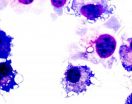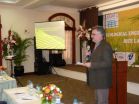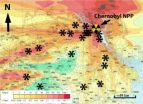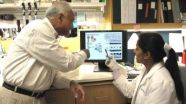(Press-News.org) New research in mice suggests that autism is characterized by reduced activity of inhibitory neurons and increased activity of excitatory neurons in the brain, but balance can be restored with low doses of a well-known class of drugs currently used in much higher doses to treat anxiety and epileptic seizures. The findings, which are reported in the March 19th issue of the Cell Press journal Neuron, point to a new therapeutic approach to managing autism.
"These are very exciting results because they suggest that existing drugs—called benzodiazepines—might be useful in treatment of the core deficits in autism," says senior author Dr. William Catterall of the University of Washington, in Seattle.
In addition to finding that mice with autistic characteristics had an imbalance between the inhibitory and excitatory neurons in their brains, Dr. Catterall and his team found that reducing the effectiveness of inhibitory neurons in normal mice also induced some autism-related deficits in social behavior. Classical benzodiazepine drugs had the opposite effect, increasing the activity of inhibitory neurons and diminishing autistic behaviors.
"Our results provide strong evidence that increasing inhibitory neurotransmission is an effective approach to improvement of social interactions, repetitive behaviors, and cognitive deficits in a well-established animal model of autism, having some similar behavioral features as human autism," says Dr. Catterall.
Therapeutic approaches to treat autistic traits in animal studies or in clinical trials have primarily focused on reducing the activity of excitatory neurons, with only modest success to date. The results reported by Dr. Catterall and his colleagues suggest that augmenting the activity of opposing, inhibitory neurons could be an alternative strategy.
Clinical trials of classical benzodiazepines and next-generation drugs that have a similar mechanism of action are now needed to determine whether the researchers' findings in mice are relevant to humans. Astra-Zeneca and the National Institutes of Health have initiated one such trial.
INFORMATION:
Neuron, Han et al.: "Enhancement of Inhibitory Neurotransmission by GABAA Receptors Having 2,3-Subunits Ameliorates Behavioral Deficits in a Mouse Model of Autism."
Low doses of antianxiety drugs rebalance the autistic brain
2014-03-19
ELSE PRESS RELEASES FROM THIS DATE:
Fetal Alcohol Spectrum Disorders (FASD): An under-recognized issue that may be on the rise
2014-03-19
March 19, 2014 – The open-access International Journal of Alcohol and Drug Research has released a special issue on Fetal Alcohol Spectrum Disorders (FASD), with the intention of increasing awareness of the negative effects of alcohol use in pregnancy and improving prevention, treatment and care for those living with FASD.
"In most countries, FASD is not well recognized by health professionals," says guest editor Dr. Svetlana (Lana) Popova, Senior Scientist in the Social and Epidemiological Research Department at the Centre for Addiction and Mental Health (CAMH). "If ...
Study describes first maps of neural activity in behaving zebrafish
2014-03-19
In a study published today (19/3/2014) in the scientific journal Neuron, neuroscientists at the Champalimaud Foundation, in collaboration with neuroscientists from Harvard University, describe the first activity maps at the resolution of single cells and throughout the entire brain of behaving zebrafish.
"This opens up new possibilities for studying neural circuits in the brain," says Michael Orger, principal investigator at the Champalimaud Neuroscience Programme. "In order to understand how the brain works, it is imperative that we can record the activity of the cells ...
Researchers uncover allergy-cancer connection
2014-03-19
While many are stocking up on allergy medicine in preparation for spring, a new study from researchers at Virginia Commonwealth University Massey Cancer Center has uncovered a new connection between allergy and cancer that could potentially lead to therapies involving common antihistamines.
Recently published in the Journal of Leukocyte Biology, the study was led by Daniel H. Conrad, Ph.D., member of the Cancer Cell Signaling research program at Massey and professor of microbiology and immunology at the VCU School of Medicine, with substantial contributions from Ph.D. ...
Growing rice the sustainable way: LEGATO holds its 3rd annual conference
2014-03-19
In a world facing the challenges of climate change, demographic boom and deficit in food resources, the word "sustainable" and the concept behind it become increasingly relevant. Sustainability in the way humanity uses available resources is key to a brighter and greener future.
In the context of sustainable food production, there is a clear need for crop productivity increases and diversification. Optimising rice ecosystem functions and services in Southeast Asia and their stabilisation under future land use and climate change, is the main focus of the project LEGATO ...
Radiation damage at the root of Chernobyl's ecosystems
2014-03-19
Radiological damage to microbes near the site of the Chernobyl disaster has slowed the decomposition of fallen leaves and other plant matter in the area, according to a study just published in the journal Oecologia. The resulting buildup of dry, loose detritus is a wildfire hazard that poses the threat of spreading radioactivity from the Chernobyl area.
Tim Mousseau, a professor of biology and co-director of the Chernobyl and Fukushima Research Initiatives at the University of South Carolina, has done extensive research in the contaminated area surrounding the Chernobyl ...
Research reveals true value of cover crops to farmers, environment
2014-03-19
Planting cover crops in rotation between cash crops -- widely agreed to be ecologically beneficial -- is even more valuable than previously thought, according to a team of agronomists, entomologists, agroecologists, horticulturists and biogeochemists from Penn State's College of Agricultural Sciences.
"As society places increasing demands on agricultural land beyond food production to include ecosystem services, we needed a new way to evaluate 'success' in agriculture," said Jason Kaye, professor of biogeochemistry. "This research presents a framework for considering ...
Researchers identify potential new therapeutic target for controlling high blood sugar
2014-03-19
DALLAS – March 19, 2014 – A UT Southwestern Medical Center study has identified a new potential therapeutic target for controlling high blood sugar, a finding that could help the estimated 25 million Americans with type 2 diabetes.
Researchers showed that lipid molecules called phosphatidic acids enhance glucose production in the liver. These findings suggest that inhibiting or reducing production of phosphatidic acids may do the opposite.
“This study establishes a role for phosphatidic acids in enhancing glucose production by the liver and identifies enzymes involved ...
NASA sees ex-Tropical Cyclone Gillian affect Indonesia
2014-03-19
The remnants of former Tropical Cyclone Gillian moved out of the Southern Pacific Ocean and into the Indian Ocean only to trigger warnings and watches for part of Indonesia on March 19. NASA's Aqua satellite passed over the stubborn storm and took a visible image of the re-organizing tropical low pressure area.
NASA's Aqua satellite passed over Gillian's remnants on March 19 at 05:30 UTC/1:30 a.m. EDT and the Moderate Resolution Imaging Spectroradiometer or MODIS instrument took a visible picture of the storm. The image showed that the storm appeared to be well-defined, ...
Satellite sees newborn So. Pacific Tropical Storm Mike
2014-03-19
NOAA's GOES-West satellite caught the birth of Tropical Storm Mike in the Southern Pacific Ocean on March 19. Mike's formation has generated warnings for the Southern Cook Islands.
NOAA's GOES-West or GOES-15 satellite captured an infrared image of newborn Tropical Storm Mike in the Southwestern Pacific Ocean on March 19 at 1200 UTC/8 a.m. EDT. Mike appeared to be a compact, rounded tropical storm with bands of thunderstorms wrapping into it. NOAA's GOES-West satellite sits in a fixed orbit in space capturing visible and infrared imagery of all weather over the western ...
The scientific legacy of colonialism in Africa
2014-03-19
Colonial legacy has a significant impact on scientific productivity across the continent of Africa, according to a study by researchers at the University of Lomé, in Togo. Writing in the International Journal of Education Economics and Development, the team suggests that Africa performs relatively poorly compared with other regions of the world. Moreover, their analysis of data for the period 1994 to 2009 shows that African nations with a British colonial legacy are much more productive than countries with French or other history. This, the team adds, correlates with superior ...






